I’ve been working on a project that has had me doing a ton of reading lately into artists and the psychology of why artists make art, and what sometimes (often) stops them from making art. And I’d very much like to hear what you guys think about the issue, because most of the readers of this blog are artists and creatives, and thus have experience with the mental health of said artists and creatives.
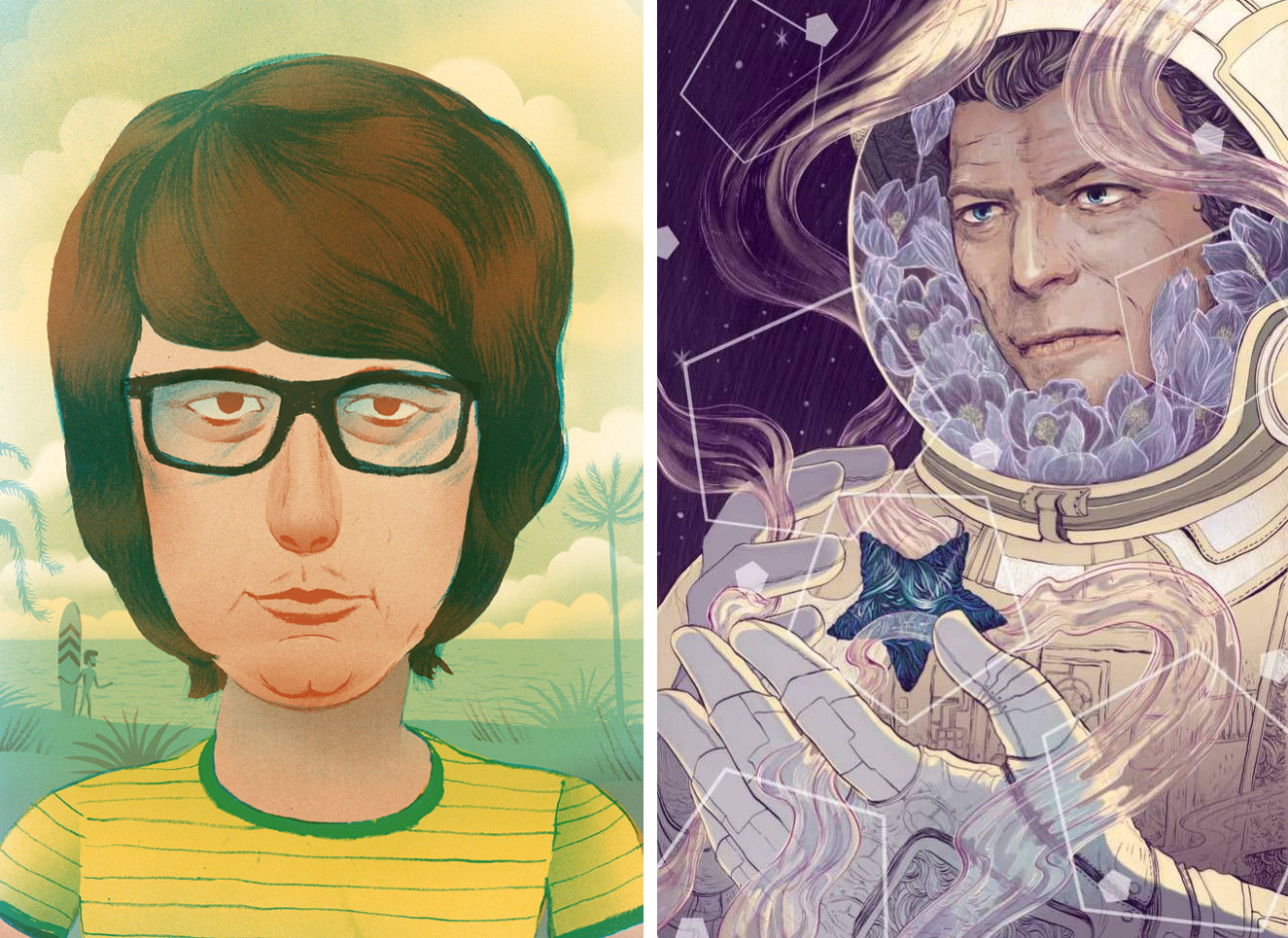 |
| Brian Wilson by Bjorn Lie • David Bowie by Daria Theodora |
First let’s define terms. When I say artists I don’t mean just visual artists. In Otto Rank’s Art and Artist (his 1932 work about the personality development of artists) an artist was defined as a “productive personality” — by which Rank meant someone who produces something. I think it’s too easy to get “productive” confused with “productivity” (aka efficiency) so I think a more accurate term for us today would be “creative”. I know that’s a fancy buzzword these days, but I think it captures the idea that we’re talking about artists and writers and musicians and all kinds of people who make creative stuff.
I’m trying to distill a very big book dense with a lot of ideas (originally written in German) down into simple terms here, so forgive me for oversimplifying if you know his work but Rank says artists make art because of two reasons:
1) The universal human fear of death makes people crave immortality, and the productive personality deals with this fear through making works that will outlast them. (As opposed to other personality types who freeze up in the face of this fear and get stuck, or ignore or avoid dealing with this fear entirely.)
And/Or
2) Productive personality types are more sensitive and take in more stimuli than non-productive personalities do. This extra stimuli/sensory information will overload them unless they do something with it, so they offload the excess energy by putting it into their creations. This second theory aligns nicely with the Highly Sensitive Person theory by Elaine Aron, which I’m currently rereading. (Thanks to Chris Oatley for reminding me of that parallel when we talked recently.)
Now, while reason #1 (fear of death) certainly holds true on some level, I have to admit most artists I know don’t start making art for immortality (or fame). Yes, I know these kinds of motivations can easily be subconscious. However, most artists I know have been making art since before they were old enough to really understand death enough to fear it — that seems kind of a post-pubescent problem at the earliest, unless you’ve had some kind of trauma in your younger childhood. And while many artists certainly do get praised for their art young, and are encouraged to continue due to that praise, that doesn’t seem to be motivation enough to choose a creative path for life.
In fact, most artists I know really didn’t choose creating. Whether they do it as full time work or on the side, creating is something they were compelled to do. Something they have to continue to do.
So that brings us to reason #2 (creating as a compulsion). It seems to me that many many artists do use creating as self-medication. Very often as a self-directed therapy. I know I do. Sure I want to create a lot of the time, but sometimes it’s a lot of work, or I just don’t feel like it, and I still have to do it, for my sanity (or semblance thereof). I’m a wreck if I haven’t made a thing in too long. However, if you dig into this reason, I think you come to a big chicken-and-egg question: Are people born more sensitive and then become artists to deal with the input overload? Or does being an artist force people to become sensitive, taking in more and more sensory info, until they are forced to keep creating or overload like a tap stuck open?
I’d really love to hear your reactions, input, and opinions to all that. I apologize if it’s not perfectly formed, these thoughts are very much still a work-in-progress, as well as mid-research.
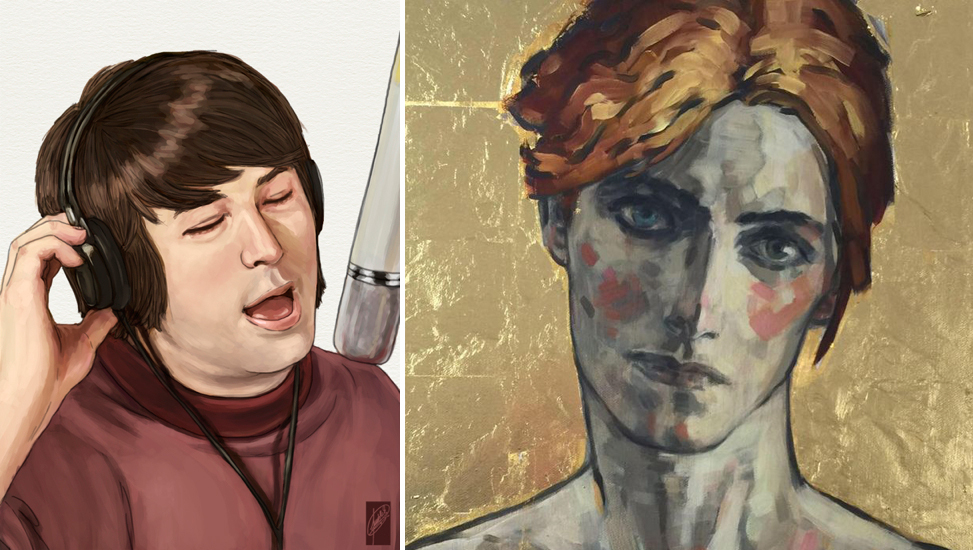 |
| Wilson by Ana Mourino • Bowie by Rebecca Leveille Guay |
This might seem like a purely theoretical mind exercise, but I think it has definite real-world implications. Recently I read Brian Wilson’s memoir, and I was struck by how profoundly his mental illness crippled his ability to make art. You may or may not be familiar with Wilson’s music, or you may suddenly be asking yourself “she doesn’t mean the surfing music guy, right?” but in short, this is a musician of such skill (I won’t say talent on this blog or Greg Manchess will kill me) that John Lennon called Pet Sounds the best album ever made. He had a nervous breakdown in the mid 60s (from some combination of overwork, a bad acid trip, depression, and maybe schizophrenia), and he wasn’t able to tour or create music for decades. He fell into an abusive doctor-patient relationship with a predatory therapist for years. Through work, family, and friends, he was able to pull out and create music again many years later, but as an obviously damaged artist and individual. Reading the memoir, I couldn’t help say to myself over and over, what creations of such a genius were lost to us because he didn’t find a way to someone who understood the mental health of artists and could support him properly enough?
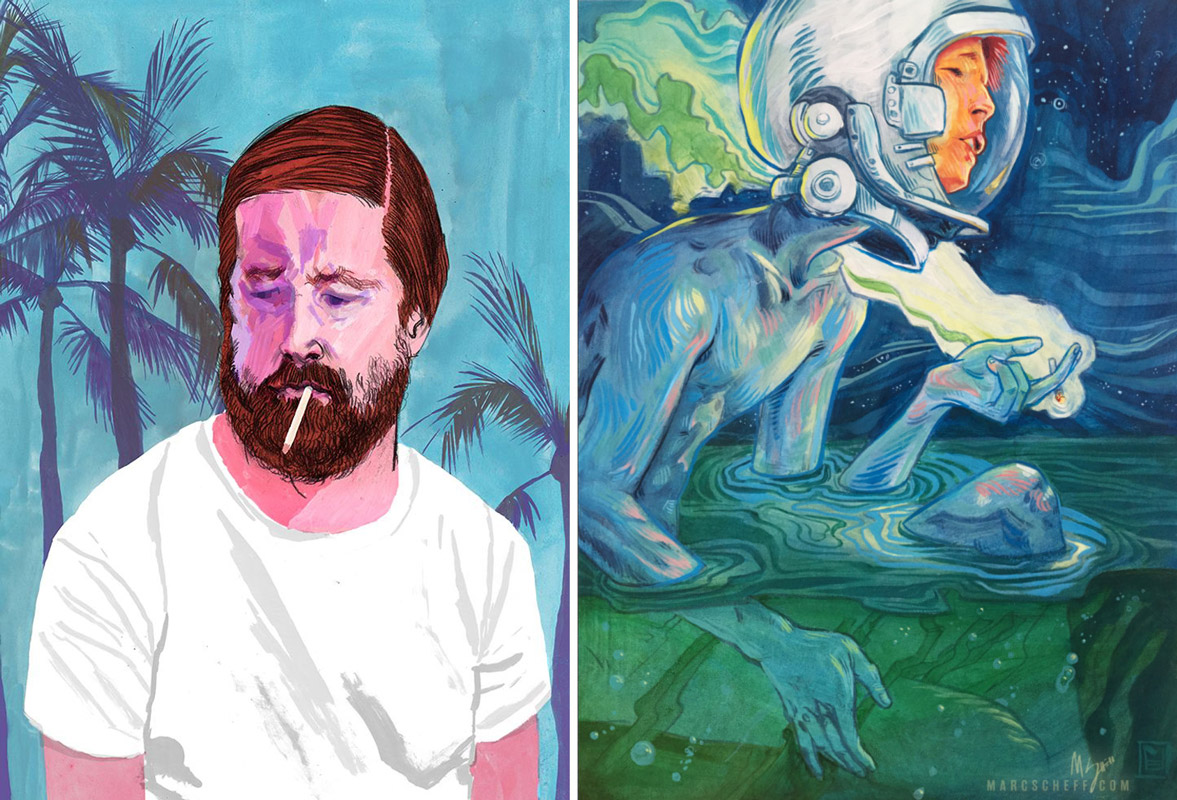 |
| Wilson by Matt Rota • Bowie by Marc Scheff |
Then I read Season of the Witch: How the Occult Saved Rock and Roll (thanks for the recommendation Mallory O’Meara) and read the chapter on David Bowie. The book is a great look at the origins of rock music and how much religion, ritual, and art have affected it throughout it’s evolution. The Bowie chapter is a great description of a man who pushed himself so hard and so far artistically, who absorbed so many influences (and cocaine) and struggled to digest and synthesize them into persona after persona, rebirth and redefinition, that he had a nervous breakdown. But Bowie was able to put himself back together and return to making art from a stronger place that supported him for the rest of a very long and insanely fruitful artistic career. It reminded me a great deal of reading that shamans and medicine men of many tribes around the world were chosen for the job because they had a mental crisis or disintegration (what we would call a breakdown today), and were able to reform their personality, often with the help of the current shaman. This also mirrors the descent into and return from the underworld in Joseph Campbell’s Hero’s Journey. If there is a musician that fits the bill of a shamanic hero artist, it’s Bowie. So what was it that made Bowie able to survive his mental demons while Wilson drowned?
I feel like the answer is somewhere in the above questions about why artists make art. I’m not cocky enough to think that’s an answer anyone is going to be able to figure out once and for all, but I think it would be critically useful to artists working today if we had a more recent working hypothesis. Could we figure out what the difference was between Wilson and Bowie? If we could distill that down into actionable steps we could save more masterworks from the jaws of mental illness, and more artists from being stuck and frustrated and in despair.
If you have a book recommendation along these lines, I’d love to hear it. If you have thoughts and/or stories about how these questions apply to you and your creative life, then please comment below.


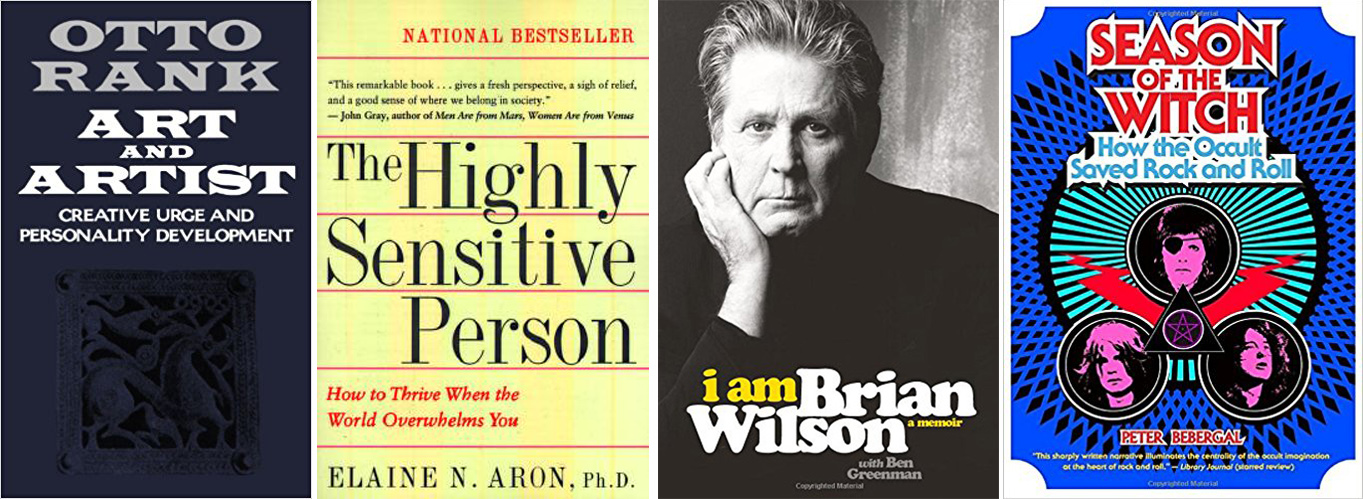
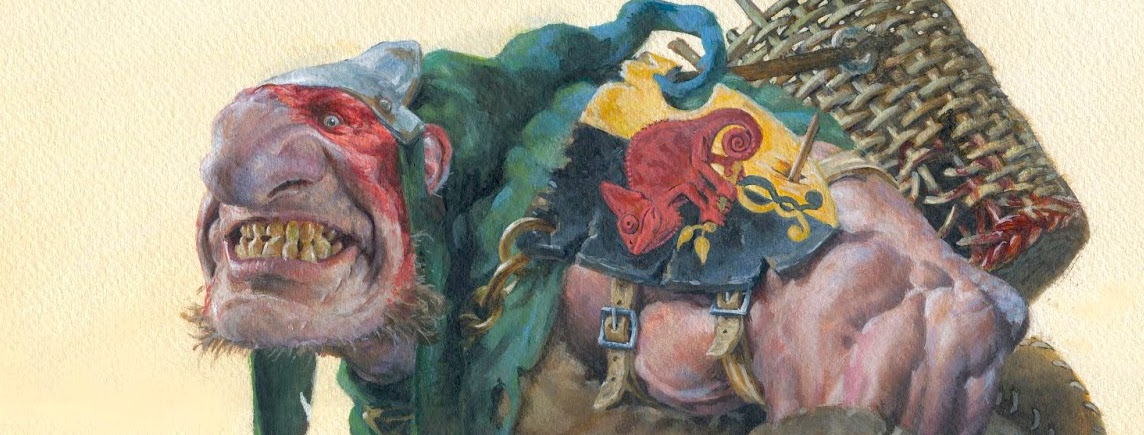
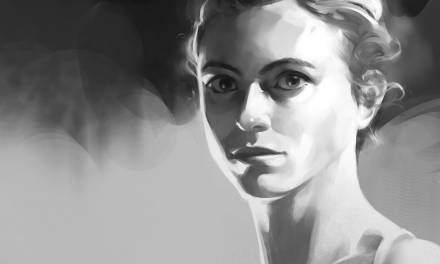
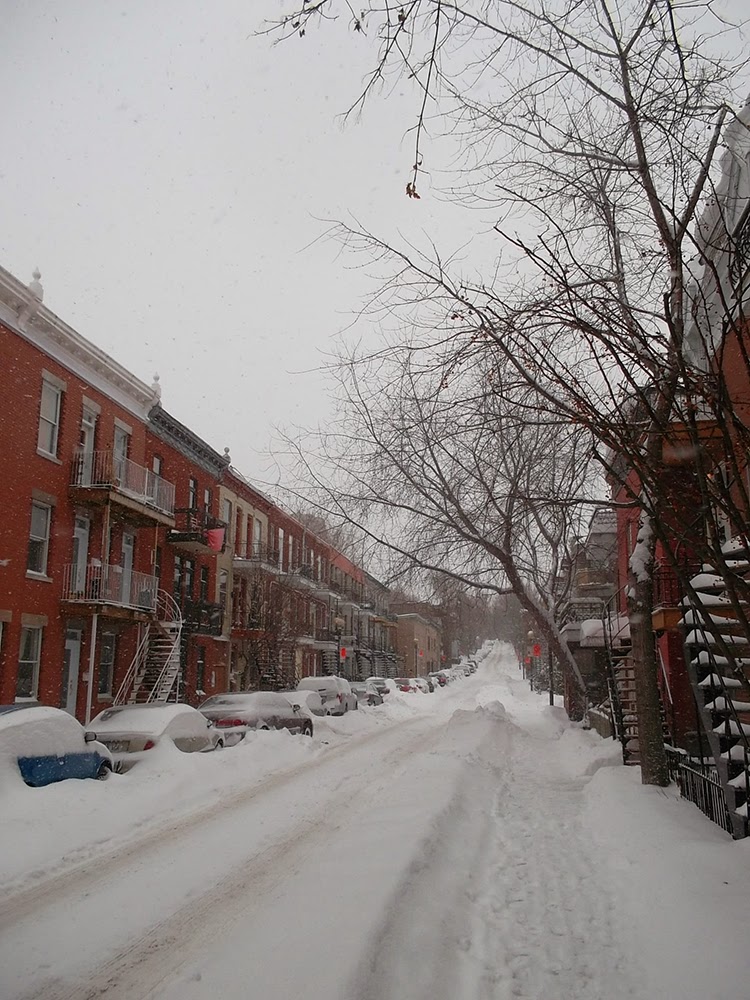
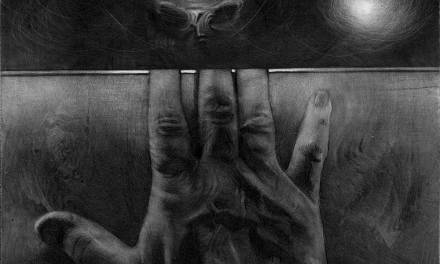
Great post. The second reason you cited reminded me of this passage from David Lindsay's 1920 novel “A Voyage to Arcturus,” when one of the characters involuntarily coughs up a jewel:
“”May I look?” asked Maskull; and, without waiting for permission, he picked it up. It was a delicately beautiful egg-shaped crystal of pale green.
“Where did this come from?” he asked queerly.
Panawe turned away, but Joiwind answered for him. “It came out of my husband.”
“That's what I thought, but I couldn't believe it. But what is it?”
“I don't know that it has either name or use. It is merely an overflowing of beauty.”
“Beauty?”
Joiwind smiled. “If you were to regard nature as the husband, and Panawe as the wife, Maskull, perhaps everything would be explained.”
Maskull reflected. “On Earth,” he said after a minute, “men like Panawe are called artists, poets, and musicians. Beauty overflows into them too, and out of them again. The only distinction is that their productions are more human and intelligible.”
“Nothing comes from it but vanity,” said Panawe, and, taking the crystal out of Maskull's hand, he threw it into the lake.”
I'm not fully on board with with the two reason, not because they can't be reasons people create, but because they're not the reasons I create.
Roger Scruton says one reason people create is to make sense of the world, seek out an ideal, or created order (Scruton speaks of these in terms of aesthetics in general). G.K. Chesterton touches on these reasons in some of his writings as well.
There's an other reason for creativity that states that we create to explore and understand our world, our souls, and others.
Their may be a more simple reason people create. Maybe some people just love beauty for beauty's sake and want to propagate beauty for themselves and others.
I'm half way through Elizabeth Gilbert's Big Magic right now, and I think she's trying to answer some of the same questions you're asking. One idea that stands out to me is that it’s important to examine the expectations we have for our creative work. I feel the compulsion to create, and yet I still sometimes work with an unconscious pressure that what I make must be extraordinary, life-changing, humanity-saving, or even just something that can pay the bills. That might be too much to ask from creative inspiration. It’s certainly enough to keep me from making art. Gilbert mentions writers like Harper Lee and Ralph Ellison, who each published one great novel but never completed another major work in their lives. Some combination of perfectionism and the fear of never surpassing their previous success kept them quiet. Each was capable. If they had written something else—anything else—just for the sake of the compulsion to create, they might have discovered greater triumphs later in life like David Bowie.
Anyway, Big Magic might be something to take a look at. I’m very interested in this topic and I’m excited to hear what else you learn. Thanks for your thoughts!
I'm sure for most people it's really some kind of mixture. But I think the first reason given by Rank is pretty big aspect of it. At least for me, I know as a teenager I was consciously looking for a profession that would sit at the intersection between things I was good at, things I enjoyed doing, and things that were “important” – that is, something that would affect society positively (one hopes) and constitute some kind of legacy. But you're right that this was a post-pubescent concern… And I did draw a lot as a kid. But still Rank's second reason doesn't seem to completely ring true for me. I remember as a kid being impressed by drawings in comic books, etc, and wanting to be that good. There was both imitation (because the drawings were “cool”) and also a sort of challenge to myself. Pretty early on I started thinking of myself as “good” at drawing. My friends and I would draw together and I was pretty competitive about it (not that I was mean to people I don't think, but I really wanted my drawing to be the “best”).
I recall a while back reading a quote from I forget who (couldn't find it again, sorry) describing what motivates painters. It said there were only two reasons that people became painters – one was because they had a fascination with the material and liked playing with it and seeing what it could do, and the other was they had seen a painting at some point and liked it and wanted to imitate it. I think this could easily be applied to all artists and I wonder if this could be combined with Rank's idea in some way to create a more nuanced theory? Perhaps a two dimensional graph, like those personality charts?
How all this relates to mental health I'm not quite sure, but I think you're right to intuit that it does, somehow. Interesting topic, I look forward to reading more comments.
This is a topic I've explored for the past couple of years. I am a socialized introvert with depression and anxiety. My day job requires a lot of interaction with people, which leaves me exhausted at the end of the day. Thus, there is little energy left to create as I am compelled to do. While I agree with the two reasons, I think with me, at least, there is a third: It gives me a voice that I am otherwise unable to speak in my day-to-day. The rub is that the aforementioned introversion that makes me more sensitive and prone to internalization, along with the lack of energy, makes it so that that little voice does not get heard.
I don't notice the same sensitivity and introversion in my older siblings, but they grew up in the same environment as I. The creativity is nature; the demonstration of it needs to be nurtured. That was not, unfortunately. I dabbled growing up, but the bubble didn't really burst until adulthood when I was already entrenched in the safe, 9-5 career. As I get older, I am better at noticing the signs when I have neglected the other side of my brain and muster up enough energy to do something, to create anything. It is a constant battle.
I read “Art and Fear: Observations on the Perils (and Rewards) of Artmaking” by David Bayles. It was . . . okay. I didn't really get anything profound out of it that sticks with me.
As for Bowie, it is obvious from the circumstances of his death that—outside of the cancer diagnosis—he was in control. From the release of his last album, the final photograph on his birthday, to his death, he was the composer, arranger, and performer of his passing. Just in life as he evolved on his terms, he left this world on his terms as much as he could. Maybe that is a big difference between him and Wilson.
Wow, your life sounds just like my own. After 8 hour work day, and when I get my children to sleep, I'm usually completely out of energy to do anything creative. I have this enormous urge to do art, but just do not have the energy.. Very, very frustrating after several years.
I'm in the same boat. I love my job, and I love my kid, but after a long day of dealing with both I am mentally wiped out. I try to create, with varying degrees of success, but it's tough to start.
A really, really interesting and necessary topic, especially now when 'being an artist' is easily mistaken for a lifestyle choice.
First of all: what I'm missing in this piece is the fact that Bowie openly spoke about mental ilness in his family (his half brother committed suicide and other family members also had problems). He was quite afraid of being affected himself and found that one way to cope with the stress of producing and performing was to find an alter ego from which to act.
There's so many angles from which to research this matter. Because while some artists tap into their perceived weaknesses, others thrive because of strong will (think Chuck Close for example).
What would be really interesting is relating this to neurological research like Kahneman's 'Thinking:Fast and Slow'. In it Kahneman explains the different circuits active in the brain during goal-oriented thinking and drifting/free associating. I have researched this a lot myself, next to neurosis and growth, and both seem to be very important to artists. One could even state that while frustration, depression and other mental battles often seem hurdles,
they quite often also seem to be primary reasons to continue this creative journey.
I myself have a serious neurological condition that affects my sleep, and have found a way to cope with the visions and lifelike dreams and nightmares by documenting them and using them as a source for my art.
On a last note: I'm also very interested what modes of thinking are used when and where in the artistic process. (Do you start with language, self talk, images, etc?) But painter's Neo Rauch and Sam Drukker warn against this type of almost scientific research, because it demistifies and weakens the power of art and the very shamanistic quality you are speaking of.
You might be interested in Denis Dutton's concept of “Darwinian aesthetics” as presented in his 2009 book, “The Art Instinct.”
I think it's only fair to other personality types to mention that the idea of of immortality projects isn't just for the creative/productive sorts. Rank saw death denial (conscious or otherwise) as common to humanity and the ways it might manifest go way beyond the production of art objects. Something as basic as attaching great importance to one's place in family can be an immortality project, as in living on, so to speak, as a cherished figure in a future family narrative.
I recently watched LOVE AND MERCY, a pretty sweet (and terrifying) film about Brian Wilson.
One thing I'd say is that Bowie, the king, surrounded himself with highly creative people and was in control the entire time until he closed the door behind him (literally).
Brian Wilson was surrounded by a bunch of douchebags siblings and a despotic father/producer figure that couldn't (under)stand his vision. Hard not to get crushed when you consider how far ahead he was, not to mentioned what followed.
The motivation behind creativity? The challenge, the thrill, the fear, the excitement, the need…
That info about Brian Wilson is terrifying, but with a semi-happy end. Makes me think of Frank Frazetta and how frustrating it must have been for him not being able to paint (after his health problems).
Good article, thanks!!!
People are different and create for different reasons. But generally, I think creative people are more perceptive and therefore get affected more easily – hence their sensitivity.
Creative work focuses the mind on a single task for longer stretches of time and it reduces sensory input/stimulation from the external world. The creative process often brings satisfaction as well. All this increases well being and reduces stress. For me, sensory overload leads to less creativity, not more.
I'm surprised that according to Otto Rank “immortality” through own art is a major reason to create. BTW, a few good books that are relevant to this topic:
The Artist and the Emotional World by John E. Gedo
The Price of Greatness: Resolving the Creativity and Madness Controversy by Arnold M. Ludwig
Private View: The Secret Lives of the World's Great Artists by Alexandra Connor
Secret Lives of Great Artists: What Your Teachers Never Told You About Master Painters and Sculptors by Elizabeth Lunday
Daily Rituals: How Artists Work by Mason Currey
I'm a mental health counselor and artist. I come from a background of existential psychology, so my take on this leans heavily on the importance of meaning. Meaning creates order out of chaos, and people really don't do well with chaos, because it means being powerless. When faced with powerlessness, people can either be swept away, or do something meaningful with it. Jung found that drawing mandalas made people feel centered. Viktor Frankl found that having a sense of purpose helped people survive concentration camps. The commenter above, Lars, uses his chaotic nights as fuel for art.
This is related to the fear of death, definitely, but I think it has a more present-focused purpose as well.
Of my clients who live with psychosis, the one who suffers the most is the one who has no idea where the voices come from. Others will say its the devil, or some pop star, or will understand that it's coming from their own mind. This person, though, has no idea, and it torments them. The only comfort they find is in crocheting.
Check out Rollo May's Love and Will for a whole book about #1 and #2. It's chock full of mythology too. Courage to Create is also good.
For some interesting reading on psychological breakdowns and being sane in an insane world, check out R.D. Laing's The Politics of Experience and The Divided Self
Stephen King's On Writing is also a good one.
As a “Creative”, my initial reaction to the two categories was “creative response is so often holding a mirror to the artist's self, or a struggle to define humanity”. How does my personal experience of “creative creation” fit within those two somewhat restrictive definitions?
These comments are great! Going thru every one! Thank you!
Experience has shown me that existence founded upon Love Light and Truth and channeling of that energy as the raison d'être, is the crucial factor differentiating lives such as those of Wilson and Bowie.
Hello Lauren,
In response to your chicken-or-egg question I have to say I don't know. In my case I have drawn or created since before my conscious memory. It was an escape from a overbearing parent and a way to process a world I didn't completely understand. It also earned me some praise and prestige among my peers. I never considered myself to be particularly sensitive (self denial and refusal to accept it) however, after a difficult “breakup” with a long time client, I learned otherwise. The activity that provided me comfort was now a source of pain and loss. I stopped creating for a few years and receeded back into my lifelong fight with depression. That was when i learned how much that reality filter was necessary Ultimately, my art has been what has helped me return to functioning reasonably. Well, that and well-balanced antidepressants! I have reached a point where my wife asks me to “go draw” when I start to get grumpy.
For me, art functions as a form of meditation when I get into the right mindset and the ideas are flowing. It is my antidepressant and I have learned that I am far more sensitive than I ever allowed myself to realize. Drawing makes the world bearable and when I can't everything falls apart. It is an integral part of my mental well-being.
Working in absolutes (two reasons to create), seems limiting. I imagine the reasons people create are as varied as the people that do it. From what I've read/understood about psychology, it appears as though generalizations can get in the ballpark on a subject but you always have to dive deep on each individual to really come to meaningful, lasting solutions. As Loic pointed out, creative people aren't just creative, they have family lives, other interests and ultimately other stresses that dictate a great deal about their lives not related to “art.” I don't know really this is an off the cuff response.
Great article!!!
This book helped me, a lot. https://www.amazon.com/Touched-Fire-Manic-Depressive-Artistic-Temperament/dp/068483183X
Thank you for starting this topic Lauren! I'm 26 and I've started drawing since the 3rd grade because of the Final Fantasy game. Being the kid that can draw and likes doing it sets me apart and I liked that and I can use the excuse of being the sensitive kid, to get away from socializing, taking parts in teams,etc. The the midst of growing up, I think that idea merged with who I am. I was very chatty when I was young (I was nicknamed Donald Duck for that very reason) , but growing older I became that very same person you were talking about. Someone who, for the lack of better word, feels more than his peer. I feel, think and react more (though not in an extroverted way) and I felt that the answer might lie in the very thing that got me there, art.
So now, I do art because it's like digging for pieces of me buried somewhere. It's damn tiring, frustrating and exhausting but the urge to do it is always there. Like I can save myself from this spiral of growing up and being an adult by painting.
Maybe it's trying to validate my identity as an artist as well, maybe it's just the inherent quality of being a sensitive person trying to outlet all the stimuli but that person is all I am capable of being (for now)
Cheers Lauren!
I don't have a lot of good answers here but as a fledgling artist with a little bit different perspective on things as is usual I can offer insight into my own journey.
I am currently 27 and actually started doodling only when I was around 22 and started to approach it seriously at 24. So I can answer that for me, as a person struggling with mental issues I have been struggling with sensory overload my whole childhood and growing up without turning to art so I can definitely say I was born sensitive first.
I turned to art in the midst of the worst battle with mental health in my life, the onset of my problems started when I was 17 and it got continually worse until I wasn't able to function at all. Thankfully I was able to find help of mental health professionals that helped me (and still are helping me) to get back on my feet and during this time, after I lost my previously preordained path of college and academic success that I never questioned, I tried to find some new plan that would make ME happier. And while I was searching and trying to get better I started mindlessly doodling and then I realized I enjoy it and got some books by Andrew Loomis and drew some more, once a month turned into once a week, slowly it turned into almost every day and then I started expanding on the amount of hours I needed to do it until it became an obsession that I don't think I could turn off at this point.
Did I start with it because I needed to establish control and order in my life? Because I was hurting so much I needed to put it somewhere so that I won't drown in it? Because I wanted to connect again to other people and life in general? Because I felt like there was so much potential in me and I so hated the feeling of needing to specialize in one academic pursuit and this provided with a potential for broad exploration of any and every question I want to answer? Because I just needed a clear task to focus on and distract myself from the barrage of inputs? I think it was a little of all and I'm not sure there is a clear cut answer for me or for any artist out there. But it's a really interesting topic and thanks for opening up the discussion, I enjoyed both the post and comments immensely.
“Are people born more sensitive and then become artists to deal with the input overload? Or does being an artist force people to become sensitive…?” Ricky Morr: It is not necessary to have sensory overload. Everyone is born sensitive. It is natural and sober. Artists choose to exercise their sensitivity because of INSPIRATION–an act of insight/feeling, intellect, and will. Once an artist chooses to exercise a media and actually finds a viable voice, a GROWTH of more insight/feeling occurs. The sense of this GROWTH becomes a nourishing exhilaration or release. THIS insight/feeling fuels more practice, and so GROWS to become ever-nourishing to the soul, the immortal soul which lives wholly on infinite inspiration. Continued OBSERVATION of the growing voice and insight/feeling, fuels renewed inspiration, and leads to the phenomenon of your question: “being an artist force[s] people to become [more] sensitive…” Yes. (Eliel Saarinen (“Search For Form”) says that the creative voice is an instrument that may grow sharp or dull, according to the conscious attention of the soul. Also see: Maritain: “Creative Intuition in Art and Poetry.”
I've had art teachers that like to lord over you, and some that just accept you and encourage you to ask questions and allow you to fail….I like the later. I do not believe that being an artist makes you sensitive to others, many seem to be only sensitive to themselves. Take Burne Hogarth for example:
http://liheliso.com/buzz/archive/00000482.htm
I think exploring the your inner voice is just that, self exploration and not necessarily an outwardly expression of altruism, maybe just survival? However, I do believe you should be sensitive to others and not lord over people, but sometimes that is just not possible. However, I'm strongly against militant behavior because that's more about control rather then growth.
You talk about sensitivity and energy….I'm extremely curious about this issue since I've encountered an art teacher that is taking lithium and some that believe they are, and since my father had this, I think it's more common then we're willing to admit:
http://news.stanford.edu/news/2005/november16/med-bipolar-111605.html
Teenagers are very sensitive….I want to think beyond a teenage mindset.
Sorry if the concepts I'm discussing don't come out in one paragraph, but Steve Rude is all about sensitivity and energy, and in lineament with what I'm talking about:
http://www.snagfilms.com/films/title/rude_dude
Maria Paz Cabardo the maker of the documentary Better Things: The Life and Choices of Jeffrey Catherine Jones, stated that Jones was hospitalized for the very things I'm talking about:
https://www.youtube.com/watch?v=1MfxQFQwnX0
I don't feel I'm a verbal person, yet I do believe I have something to say. People will often not allow you to express an opinion because they feel you lack experience or have some kind of quality that is contrarian to mass cultural belief. If that's the case, then I'll let somebody express those opinions for me, that'll make you realize you're not alone in your perceptions. It's there:
https://www.youtube.com/watch?v=qPGQrHFnK30
My experiences with bipolar people is that they seem to work over people with emotional black mail and black and white thinking….personal experience.